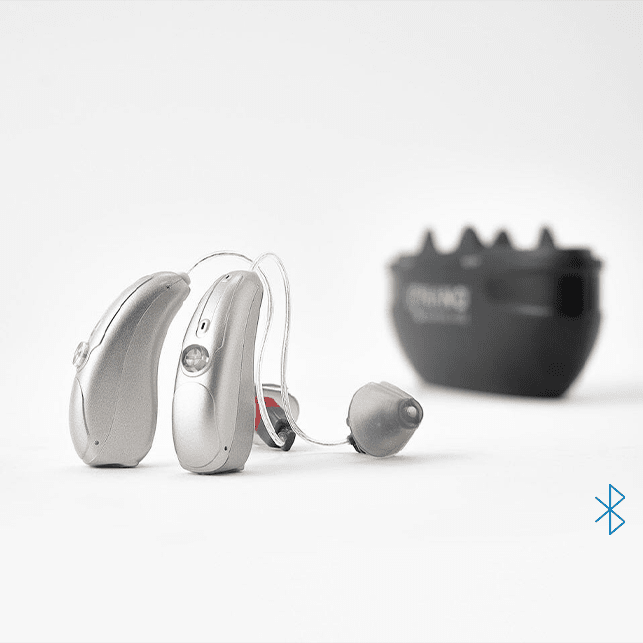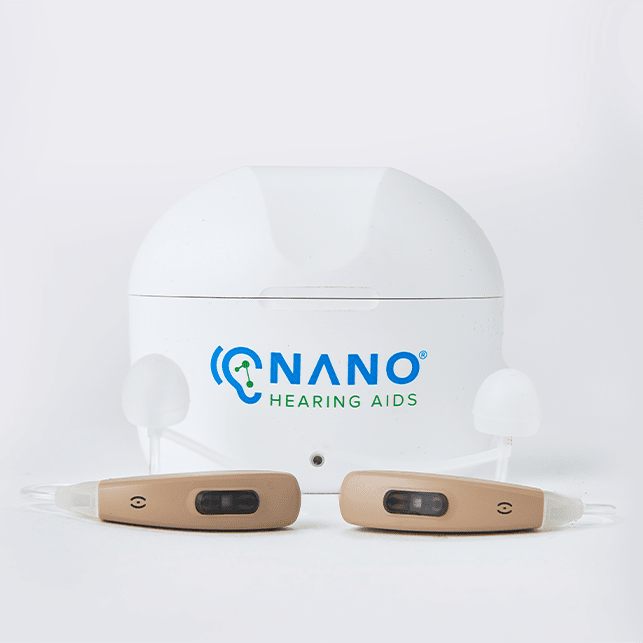Hearing loss is assessed by how loud a sound must be for you to hear it. With age comes a loss of hearing, but hearing impairment is challenging and can change over time.
Hearing loss is linked to cognitive decline; however, hearing devices may tackle different degrees of hearing loss.

How is Hearing Loss Measured?
An audiologist will measure your hearing loss in decibels (dB) during the hearing test session. The hearing impairment is shown on an Audiogram as loudness vs pitch of sounds. This helps to determine the condition of your hearing.
Audiologists can perform a variety of hearing tests to determine the type of hearing impairment you have.

Hearing can be evaluated using earbuds to determine the type of hearing loss. So, your doctor may place a small vibrator on your head, which bypasses the middle ear and the eardrum to measure sound waves that directly reach the cochlea in the inner ear.
The earbuds will allow them to hear different tones of different frequencies, one at a time. Each tone intensity is changed to identify the threshold at which they can hear it. This threshold entirely varies among people.
So, here are some of the hearing impairment thresholds that can help you identify the intensity of your hearing.
| Mild Hearing Loss | HL 26-40 dB |
| Moderate Hearing Loss | HL 41-55 dB |
| Sever Hearing Loss | HL 71-90 dB |
| Profound Hearing Loss | HL 90+ dB |
Degrees of Hearing Loss
Mild hearing loss
Mild hearing loss is the inability to hear sounds that are below 15 decibels for children and 25 decibels for adults. In this range, sounds like footsteps on floors/carpets or hushed conversations are also included.
Moreover, with mild hearing impairment, you may also have issues hearing both low- and high-frequency noises within the range, though generally, people tend to lose the ability to hear high-frequency frequencies first.
Symptoms:
Causes: There are several explanations for mild hearing loss. Here are some of the causes:
Debrox or Odinell may help you to get rid of earwax. If this doesn't work, an audiologist may be required to remove the accumulation. Do not insert cotton swabs into the ear canal. They can damage earwax or even puncture the eardrum.
Always consult a doctor immediately if you have hearing loss, fever, and ear pain.
Hearing loss caused by occupational risks such as excessive, continual loud noise and ototoxic chemicals might result in permanent hearing loss.
Moderate Hearing Loss
The quietest sounds heard by healthy ears are between 35 and 49 dB. Moderate hearing loss causes difficulty hearing in many circumstances and even causes issues with carrying out conversations. However, hearing aids can help those with moderate hearing loss.
Symptoms:
Causes:
Severe Hearing Loss
Severe hearing impairment takes place in between 71-90 dB. When you have a severe hearing impairment, you would likely turn up the TV's volume or even face issues hearing doorbells and telephones ringing.
Symptoms:
Causes:
Hearing loss can be accelerated by having high blood pressure. To discover more about the relationship between hearing loss and high blood pressure, read our article in full.
Profound Hearing Loss
Profound hearing impairment is the inability to hear sounds below 90. Simply put, a person who has profound hearing impairment may not hear someone yelling or even loud television sounds.
Symptoms:
Causes:
Meniere's disease is an inner ear disorder that can result in dizzy spells (also known as vertigo) as well as hearing loss in some people.

Types of Hearing Loss
Conductive Hearing Loss
Conductive hearing loss occurs when the outer or middle ear is blocked or damaged. This hearing impairment prevents sound from reaching your inner ear. Conductive hearing loss can take place due to many reasons. In many cases, this type of hearing impairment is treatable.
Symptoms: Conductive hearing loss symptoms include:
Causes:
The outer ear issues are:
Middle ear issues are:
Sensorineural Hearing Loss
Sensorineural loss occurs when the inner ear hair cells or the auditory nerve that sends nerve impulses to your brain gets damaged. The causes of this type of hearing impairment are aging, loud noises, genetic, hearing impairments, certain drugs, and inner ear infections.
Symptoms:
Causes:
Mixed Hearing Loss
Mixed hearing loss combines conductive and sensorineural hearing impairment characteristics. The outer and inner ear are damaged during this hearing loss type. Moreover, the outer ears cannot transmit sound to the inner ears, which cannot process sound to the brain.
Symptoms:
Causes:
Auditory Neuropathy Spectrum Disorder
Auditory neuropathy spectrum disorder (ANSD) occurs when the auditory nerve gets damaged. The cochlea sends messages to the brain through this channel. ANSD is more common in children born early or if ANSD runs in the family.
Symptoms:
Causes:
How to Diagnosis Hearing Loss
Hearing is tested using a variety of non-electronic tests and tools. They frequently use tuning forks to diagnose hearing issues. Common tests include:
Rinne Test
Comparison of sound delivered by air or bone conduction to the patient's perception. One hand vibrates a tuning fork on the patient's mastoid bone (bone conduction). The tuning fork's ends are then put in the external ear canal's entrance (air conduction). The results of both conduction channels can help locate the lesion causing hearing loss.
Weber test
The Weber test detects unilateral conductive and sensorineural hearing impairment. A tuning fork is placed in front of the patient, who must then say they hear the tuning sound from the side.
Audiometry
Audiometry is the use of electrical instruments to test hearing. An audiometry can produce the sounds needed to research hearing.
Pure Tone Audiometry
This test measures the patient's hearing and locates the damage. The patient's hearing threshold is detected using both air and bone conduction. Afterward, each of the thresholds is marked with a set of internationally recognized symbols, creating an audiogram.
Speech Audiometry
Instead of pure tones, speech audiometry assesses the patient's residual hearing.
Associated Diseases of Hearing Loss
Hearing Loss and Dementia
Hearing loss increases cognitive load, diverting information from other cognitive processes like working memory to auditory processing. Hearing loss may also lead to isolation and is strongly linked to dementia.
Hearing Loss and Diabetes
Diabetes can severely damage your ear nerves. Moreover, high sugar levels may harm inner ear blood vessels and nerves over time. Low blood sugar can also disrupt the inner ear-to-brain nerve transmission channel. Severe hearing impairment is caused due to nerve injury.
Hearing Loss and Blood Pressure
High blood pressure damages blood vessels. The damage isn't centered, but one thing's for sure, it affects the whole body, including the ears. Hearing impairment can take place when blood vessels in the ears are injured, and fatty plaque builds up.
A Possible Solution of Hearing Loss
Hearing aids relieve hearing strain. Moreover, hearing devices with digital technology offer increased clarity even in noisy and crowded areas.
When you have a hearing device, you can have:
Two Hearing Aids Are Better Than One:
Experts highly advise two hearing aids. Two hearing devices provide these advantages:
Locate Sounds:
Hearing aids provide information to the central nervous system, causing those cells to become active.
Hearing better in crowded areas:
Two microphones can block out considerable background noise. This option is useful only if you have two hearing devices. Moreover, if someone speaks to your unassisted ear, their voice weakens as it gets to your hearing aid ear. Speech may be difficult to hear if the room is filled with background noise.



